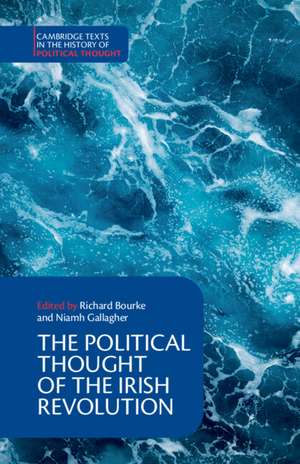The Political Thought of the Irish Revolution: Cambridge Texts in the History of Political Thought
Editat de Richard Bourke, Niamh Gallagheren Limba Engleză Paperback – 4 mai 2022
| Toate formatele și edițiile | Preț | Express |
|---|---|---|
| Paperback (1) | 178.87 lei 3-5 săpt. | +20.41 lei 7-13 zile |
| Cambridge University Press – 4 mai 2022 | 178.87 lei 3-5 săpt. | +20.41 lei 7-13 zile |
| Hardback (1) | 532.69 lei 6-8 săpt. | |
| Cambridge University Press – 4 mai 2022 | 532.69 lei 6-8 săpt. |
Din seria Cambridge Texts in the History of Political Thought
-
 Preț: 199.23 lei
Preț: 199.23 lei -
 Preț: 288.33 lei
Preț: 288.33 lei -
 Preț: 147.20 lei
Preț: 147.20 lei -
 Preț: 192.75 lei
Preț: 192.75 lei -
 Preț: 123.27 lei
Preț: 123.27 lei -
 Preț: 226.68 lei
Preț: 226.68 lei -
 Preț: 161.78 lei
Preț: 161.78 lei -
 Preț: 116.10 lei
Preț: 116.10 lei -
 Preț: 231.29 lei
Preț: 231.29 lei -
 Preț: 128.84 lei
Preț: 128.84 lei -
 Preț: 199.23 lei
Preț: 199.23 lei -
 Preț: 144.69 lei
Preț: 144.69 lei -
 Preț: 198.93 lei
Preț: 198.93 lei -
 Preț: 178.11 lei
Preț: 178.11 lei -
 Preț: 156.88 lei
Preț: 156.88 lei -
 Preț: 122.45 lei
Preț: 122.45 lei -
 Preț: 124.33 lei
Preț: 124.33 lei -
 Preț: 132.55 lei
Preț: 132.55 lei -
 Preț: 119.68 lei
Preț: 119.68 lei -
 Preț: 130.10 lei
Preț: 130.10 lei -
 Preț: 207.72 lei
Preț: 207.72 lei -
 Preț: 295.98 lei
Preț: 295.98 lei -
 Preț: 193.53 lei
Preț: 193.53 lei -
 Preț: 339.90 lei
Preț: 339.90 lei - 8%
 Preț: 467.17 lei
Preț: 467.17 lei -
 Preț: 140.39 lei
Preț: 140.39 lei -
 Preț: 176.62 lei
Preț: 176.62 lei -
 Preț: 121.24 lei
Preț: 121.24 lei -
 Preț: 177.82 lei
Preț: 177.82 lei -
 Preț: 209.15 lei
Preț: 209.15 lei -
 Preț: 208.68 lei
Preț: 208.68 lei -
 Preț: 205.41 lei
Preț: 205.41 lei -
 Preț: 101.03 lei
Preț: 101.03 lei -
 Preț: 188.94 lei
Preț: 188.94 lei -
 Preț: 189.91 lei
Preț: 189.91 lei -
 Preț: 183.45 lei
Preț: 183.45 lei -
 Preț: 178.53 lei
Preț: 178.53 lei -
 Preț: 135.71 lei
Preț: 135.71 lei - 14%
 Preț: 694.86 lei
Preț: 694.86 lei - 14%
 Preț: 732.13 lei
Preț: 732.13 lei - 11%
 Preț: 686.44 lei
Preț: 686.44 lei - 14%
 Preț: 767.93 lei
Preț: 767.93 lei - 14%
 Preț: 681.68 lei
Preț: 681.68 lei
Preț: 178.87 lei
Nou
Puncte Express: 268
Preț estimativ în valută:
34.23€ • 35.83$ • 28.32£
34.23€ • 35.83$ • 28.32£
Carte disponibilă
Livrare economică 15-29 martie
Livrare express 01-07 martie pentru 30.40 lei
Preluare comenzi: 021 569.72.76
Specificații
ISBN-13: 9781108799133
ISBN-10: 1108799132
Pagini: 300
Dimensiuni: 138 x 215 x 24 mm
Greutate: 0.53 kg
Ediția:Nouă
Editura: Cambridge University Press
Colecția Cambridge University Press
Seria Cambridge Texts in the History of Political Thought
Locul publicării:Cambridge, United Kingdom
ISBN-10: 1108799132
Pagini: 300
Dimensiuni: 138 x 215 x 24 mm
Greutate: 0.53 kg
Ediția:Nouă
Editura: Cambridge University Press
Colecția Cambridge University Press
Seria Cambridge Texts in the History of Political Thought
Locul publicării:Cambridge, United Kingdom
Cuprins
Acknowledgements; Introduction Richard Bourke; Bibliographical Essay; Chronology of Events; Biographies; Note on the Texts; 1909: 1. Women, Ideals and the Nation Constance Markievicz; 1910: 2. From Labour in Irish history James Connolly; 1911: 3. From 'Pitt's Policy' Arthur Griffith; 4. From the Framework of Home Rule Erskine Childers; 1912: 5. 'Home Rule and the Colonial Analogy' L. S. Amery; 6. 'Settlement of an Old Controversy' Edward Carson; 7. Ulster's Solemn League and Covenant; 8. Ulster's Solemn League and Covenant (Women's Declaration); 9. 'The Economics of Nationalism' Thomas M. Kettle; 1913: 10. From A Fool's Paradise A.V. Dicey; 11. 'The North Began' Eoin MacNeill; 12. The Coming Revolution Patrick Pearse; 1914: 'Labour and the Proposed Partition of Ireland' James Connolly; 14. 'Our Duty in the Crisis' James Connolly; 15. 'A Continental Revolution' James Connolly; 16. 'Speech on the Suspensory Bill' John Redmond; 1915: 17. 'A War for Civilization' James Connolly; 18. From the Re-conquest of Ireland James Connolly; 19. 'O'Donovan Rossa: Graveside Panegyric' Patrick Pearse; 1916: 20. 'What is a Free Nation?' James Connolly; 21. Proclamation of the Republic: Poblacht na h Éireann; 22. The Sovereign People Patrick Pearse; 1917: 23. 'State of Ireland' Hanna Sheehy Skeffington; 24. A Defence of the Convention Horace Plunkett; 1918: 25. Ireland and a People's Peace Louie Bennett; 26. Loyalty and Disloyalty: What it Means in Ireland Alice Stopford Green; 27. Ourselves Alone in Ulster Alice Stopford Green; 1920: 28. 'Ulster the Facts of the Case' Robert Lynd; 1921: 29. Is Ireland a Danger to England? Erskine Childers; 30. 'Debate on Treaty' Arthur Griffith; 1922: 31. From Ulster's Stand for Union Ronald McNeill; Index.
Recenzii
'Bourke and Gallagher's book tells us that this body of specifically political writing can be and should be placed alongside the thinking of other revolutionary processes, or other histories of secession or decolonisation, or alongside the political ideas of the European war or of the great re-arrangement of states, nations and one-time empires which was the global context for the Irish struggles. Irish political ideas and writing deserve to be studied and evaluated in their own terms, not merely as part of the discursive mix underpinning a Yeats poem or a party campaign. Richard Bourke and Niamh Gallagher's excellent anthology shows us where to start.' Conor McCarthy, Dublin Review of Books
Descriere
These texts demonstrate the diversity of opinion on the so-called 'Irish Question' in the final years of Anglo-Irish Union.
